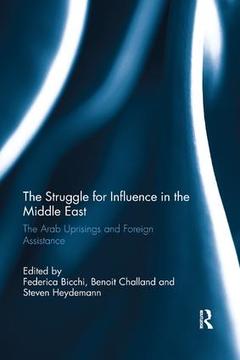The Struggle for Influence in the Middle East The Arab Uprisings and Foreign Assistance Routledge Studies in Mediterranean Politics Series
Coordonnateurs : Bicchi Federica, Challand Benoit, Heydemann Steven

This collection of research papers explores the impact of the Arab uprisings on the politics and political economy of foreign aid provision in the MENA region. Contributions focus on the foreign assistance policies and strategies of key donors (United States, Europe, Gulf countries and Turkey), and on the relationship between donors and recipients of foreign aid in a select set of MENA cases (Tunisia, Egypt, Palestine and to a lesser extent Morocco).
Despite widespread rhetoric among lead donors pledging to support the transformational potential of the Arab uprisings, the contributions find a more complex pattern in foreign aid provision since 2011. Among Arab donors, who have played a significant role as providers of aid to states most affected by mass protests, trends in foreign assistance reflect the competing priorities of donors, and their willingness to politicize aid provision in pursuit of their strategic interests. Among Western donors, authors find a high degree of continuity. Chapters that focus on Western donors seek to account for continuity on the part of Western governments and the EU at a moment of profound transformational potential. Two factors, bureaucratization and securitization, capture most of the explanations provided, which take into account a variety of local dimensions as well. Contributions also discuss the changing assistance environment, namely the globalization of foreign assistance, the complex bureaucratic arrangements presiding over the delivery of European and US aid, and the role of regional and international non-democracies in the provision of foreign assistance.
This book was published as a special issue of Mediterranean Politics.
Foreword 1. Revisiting Aid in the Arab Middle East 2. America’s Response to the Arab Uprisings: US Foreign Assistance in an Era of Ambivalence 3. The Politics of Foreign Aid and the European Neighbourhood Policy Post-Arab Spring: ‘More for More’ or Less of the Same? 4. Turkey as an ‘Emerging Donor’ and the Arab Uprisings 5. EU Democracy Promotion in Tunisia and Morocco: Between Contextual Changes and Structural Continuity 6. Foreign Aid and Security Sector Reform in Tunisia: Resistance and Autonomy of the Security Forces 7. International Assistance to Egypt after the 2011 and 2013 Uprisings: More Politics and Less Development 8. Explaining the Patterns of the Gulf Monarchies’ Assistance after the Arab Uprisings 9. Unwilling to Change, Determined to Fail: Donor Aid in Occupied Palestine in the aftermath of the Arab Uprisings 10. Conclusion: Continuities and Discontinuities in Foreign Assistance 11. Post-scriptum: Foreign Aid at the Time of Humanitarian Intervention
Federica Bicchi is Associate Professor at the Department of International Relations, London School of Economics, UK.
Benoit Challand is Assistant Professor at New York University, USA.
Steven Heydemann is Vice President on Applied Research on Conflict at the US Institute of Peace. He is also adjunct professor at the Department of Government, Georgetown University, USA.
Date de parution : 01-2018
15.6x23.4 cm
Date de parution : 11-2015
15.6x23.4 cm
Thèmes de The Struggle for Influence in the Middle East :
Mots-clés :
EU Democracy Promoter; Arab countries; Arab Uprisings; Arab uprisings; Arab spring; Humanitarian Aid; European Union; MENA Region; Gulf countries; EU Foreign Policy; Middle East; North Africa; Arab MENA; Turkey; EU's Mediterranean Policy; United States of America; EU Aid; bureaucratisation; Palestinian Authority; foreign aid; Muslim World; securitisation; Dg Relex; Democracy Promotion; Net FDI; Civil Society; EU Democracy; Dg Dev; EU's External; Turkey's Aid; EU Special Representative; post-Arab Spring Context; Gulf Aid; EU Budget; NATO Operation; SSR Contribution; EU Delegation



